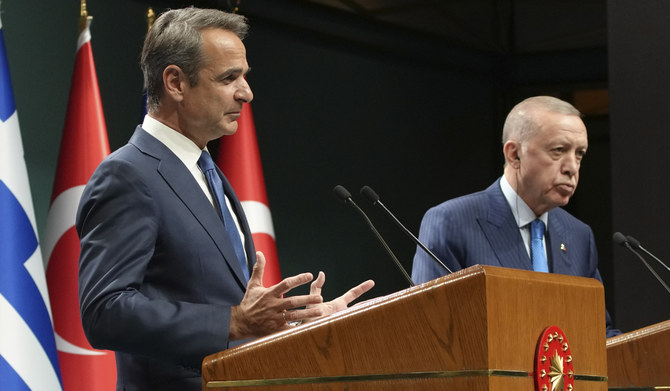Gulf states may benefit from Turkish-Greek detente
Gulf states may benefit from Turkish-Greek detente

The Gulf states have increasingly shown an interest in the Eastern Mediterranean over the past few years. Their involvement in the region initially coincided with escalating tensions between Turkiye and Greece, ultimately entangling them in that rivalry as they aligned themselves with the conflicting parties.
As Turkish-Greek relations strained over drilling rights in the Eastern Mediterranean, the relations between Greece and the Gulf states — in particular Saudi Arabia and the UAE — intensified. In February 2021, Bahrain, Saudi Arabia and the UAE participated in an event held in Athens called the “Philia Forum” (philia means friendship in Greek) — a meeting that caused unease in Ankara. Egypt, France and the Greek Cypriot administration also participated. During that period, Turkiye’s relations with most of the countries that Greece invited to the forum soured.
Also, the growing convergence and cooperation in energy and security matters in the Eastern Mediterranean between Greece, Israel and Arab states, which was institutionalized in 2019 through the East Mediterranean Gas Forum, became a significant concern for Ankara. The exclusion of Turkiye from such platforms, due to its strained ties and disagreements with most member states, at times intensified tensions, most notably with Greece.
However, the present situation differs significantly from those times. Since 2021, Turkiye has engaged in a normalization process with the Gulf states, Egypt and Israel. Ankara’s normalization with these stakeholders became significant in terms of detangling them from Turkiye’s dispute with Greece in the Eastern Mediterranean. With the recent mending of ties with Athens, Ankara is now at the final stage of its regional normalization phase.
Greek Prime Minister Kyriakos Mitsotakis met Turkish President Recep Tayyip Erdogan during his visit to Ankara this week. These two leaders, who were both reelected last year, have started taking high-profile steps to strengthen the normalization process. This was their fourth meeting in a year. Last year, they agreed to put their disputes aside and focus on areas where they can find agreement. This was confirmed this week, as Erdogan and Mitsotakis underscored that there were “no unsolvable problems” between their countries.
With the recent mending of ties with Athens, Ankara is now at the final stage of its regional normalization phase
Sinem Cengiz
Ankara and Athens are now trying to find a way to compartmentalize their issues and build the new era on a “positive agenda” that will include cooperation in the trade, energy, education and cultural realms. It seems like this positive agenda is clearly bearing fruit in terms of their cooperation on migrant flows, as well as on tourism. Mitsotakis stated that Greece would back additional EU funding to Turkiye for the migrant issue. In regard to tourism, the increasing number of Turkish citizens visiting the Greek islands in the eastern Aegean is promising, strengthening the two countries’ political, economic and cultural ties alike.
The changing dynamic in the Eastern Mediterranean is expected to affect countries with interests in the region, including the Gulf states. Although the Gulf states’ increased involvement initially coincided with regional rivalries and geopolitical tensions, it is crucial to recognize that shared antagonism toward Turkiye was not the sole driver behind their engagement in the region.
Historically, the relationship between the Gulf and the Eastern Mediterranean was primarily rooted in economic and trade ties, albeit at a relatively modest scale. Although the Gulf states are latecomers to the Eastern Mediterranean, their interests should be analyzed in the broader context, which has international, regional and local dimensions. The growing focus of Gulf states on the Eastern Mediterranean is part of a larger pattern of their expanding ambitions, while also reflecting the evolving geopolitical dynamics across the region.
In the international context, closer ties between Gulf and EU states, Greece in particular, comes at a time when US policy in the region is being reassessed following the uncertainties of the Trump and Biden presidencies. In the regional context, closer ties came when relations with Turkiye were strained. However, the Gulf states are now building political and economic capital in their relations with Ankara, with comprehensive free trade deals, strategic dialogue mechanisms and defense collaboration. Yet, stronger ties with Turkiye will not be at the expense of their growing relations with Greece because the Gulf states are seeking to grow their number of partners in the region.
Turkish-Greek normalization will be a win-win situation, especially at a time when Israel’s war in Gaza is jeopardizing the security of the Eastern Mediterranean. Prior to the Gaza war, natural gas discoveries in the area offered attractive prospects and promised new development opportunities. The prolonging of the war in Gaza carries potential risks to the interests of Turkiye, Greece and the Gulf states.
The growing focus of Gulf states on the Eastern Mediterranean is part of a larger pattern of their expanding ambitions
Sinem Cengiz
Lastly, the Gulf states, which are currently diversifying their policies domestically and abroad according to their various “Vision” plans for the future, consider closer ties with both Turkiye and Greece key to their quest of extending their soft power. The cultural and tourism sectors play a central role as they seek to diversify their economies away from oil.
The Gulf states could also contribute to the moderate atmosphere in relations and strengthen the positive agenda between Greece and Turkiye. This could start with Turkiye’s inclusion in the cooperation and friendship mechanisms in the Eastern Mediterranean, which stand as a convergence point of geopolitics and geoeconomics. This would contribute to the development of an interconnected Eastern Mediterranean region. From energy cooperation to maritime security and from tourism to trade, there are several initiatives that the Turkiye-Gulf-Greece trio can explore.
The Eastern Mediterranean’s security landscape is likely to be significantly influenced by the two contradictory trends of Israel’s Gaza war and the improving relations between Greece and Turkiye. While the former poses challenges, the latter offers opportunities for the Gulf states.
• Sinem Cengiz is a Turkish political analyst who specializes in Turkiye’s relations with the Middle East. X: @SinemCngz
Disclaimer: Views expressed by writers in this section are their own and do not necessarily reflect Arab News’ point of view



